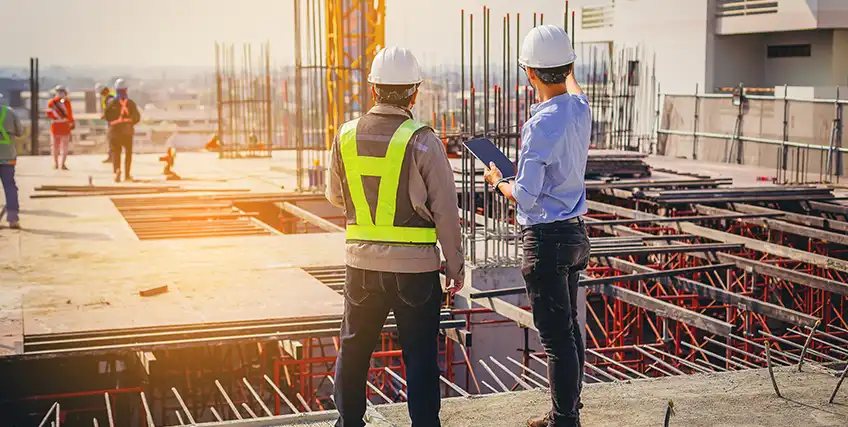Denied! What to Do When Your Construction Loan Hits a Roadblock
March 03, 2025 | Last Updated on: March 05, 2025

A construction loan can help finance your real estate project, whether you’re building a new home or renovating an existing property. Construction loans can be used for residential or commercial projects and can pay for everything from the land you’re building on to the actual new or updated structure. While some construction loans remain in place as your standard mortgage loan, others can be converted (construction-to-permanent loans), helping you lock in lower interest rates once your dream home or commercial building is complete.
However, sometimes construction loans come with their own set of hiccups. From more stringent eligibility criteria than a traditional mortgage to the complexity of shifting to a permanent mortgage loan at the end of the project, construction loans aren’t for everyone.
Here’s a look at how to get a construction loan, why construction loans may take longer than expected to be approved and funded, and what homeowners and builders can do if the construction loan you need is denied.
What Are Construction Loans?
Construction loans are a form of financing used to cover a real estate purchase that will involve a lot of work. Whether you buy land and decide to build a new construction home, or purchase an existing building that will be completely renovated, construction loans can help pay for not only the initial purchase but also the entire construction process.
Some construction loans provide borrowers with a lump sum loan amount that they can use to make their real estate purchases and pay for home building, home renovations, or business building costs. Others may operate more like a line of credit, allowing you to pull from the total preapproved loan amount as needed to pay for materials or labor expenses.
Depending on the lender, construction loans may be available for both residential and commercial borrowers. So whether you’re trying to build your dream home or want to remodel a building into your ideal business space, these loans can pay for land, the cost of building materials, and construction costs.
Types of construction loans
Construction loans come in a few different flavors:
- One-time close construction loans combine an initial home construction loan with permanent financing, so you will have the same loan on day one as when the property is built and finished. You’ll only have to close once (and only pay those fees once), though your loan may be interest-only until your project is complete.
- Two-time close construction loans cover your financing needs in two segments. The first is a short-term loan that covers the initial real estate purchase and the construction phase of your project, often at a higher interest rate and with a more limited repayment term than a conventional mortgage loan. At the end of the construction period, you’ll have another closing and convert the construction loan into a more traditional mortgage loan, usually with a lower interest rate and longer terms.
- Renovation loans are construction-only loans. This funding is meant for home buying (or the refinance) of an existing property that needs renovation or extensive repairs, not building a new construction property. It acts like a combined home and contractor loan, allowing you to roll any expected repair costs into your mortgage loan with only one interest rate, repayment term, and set of closing costs. If you already own the land where the project is being completed, you may be able to use the equity as collateral to secure your loan.
Why a Construction Loan Could Be Denied or Delayed
Construction loans can be a great way to purchase property, build a home or business, and even renovate. You can use the loan disbursement to cover general contractor costs, buy supplies and materials, pay for permits, and fund other building expenses until your property is ready to go. But what happens if your construction loan is denied, or you run into a roadblock in phase two of a two-time close mortgage loan?
Some reasons your initial construction loan application might be denied include:
- You have a limited credit history or low credit score.
- You don’t have the necessary down payment (or property equity) to qualify for your loan.
- Your project documentation and/or plans aren’t sufficient for the lender.
- Your debt-to-income ratio (DTI) is too high.
- There are issues with the property’s appraised value.
Even if your loan application isn’t denied, you could still find that approval or funding is delayed. A delay can happen because:
- Your project is too complex or risky for the lender
- There is an underwriting backlog
- You haven’t submitted the necessary paperwork, documentation, permits, etc.
Be sure to keep in contact with your loan officer as your application progresses to see what else you can provide to get your construction loan processed and funded.
Steps to Take If Your Construction Loan Is Denied or Delayed
If you’re trying to lock in an adjustable-rate or fixed-rate construction loan for your new build or renovation project, getting notice of a loan denial could really set you back.
1. Communicate
Your first step is to talk to your lender. Reach out to your point of contact and ask why the loan is being denied (or notably delayed). In some cases, a delay might be as simple as you forgetting to provide a form or sign a disclosure. A denial might be due to income that the lender forgot to include, a miscommunication about the project scope, or even an error on your credit report that no one caught. In these cases, getting your loan application back on track might only take a day or two.
If your loan delay or denial is due to something outside of your control — like a too-high DTI, low credit score, or local regulations that would impede your planned construction — you might need to pivot. Your lender could offer suggestions for improving your application, revising your loan request, or simply optimizing your personal finances for future applications.
2. Review and improve your financial situation
Ideally, you’ll check your credit reports for any errors or score-lowering situations before even exploring your loan options. If you’ve been denied a construction loan, though, it’s often a good idea to revisit these reports. Look for errors, high balances on credit cards, or too much debt.
To improve your current or future applications, make sure to pay your bills on time each month and reduce your debt as much as possible. You could also work to save a larger down payment; contributing more toward your constriction loan can help you lock in a lower-rate mortgage, reduced monthly payment, and/or better approval odds.
3. Look into project issues
Construction loans are unique in that lenders provide funding for the property and its improvement, so there’s a vested interest in the construction project. If there are issues with your construction plans, permits, licensing, expenses, or timeline, your loan application might be delayed or denied.
Make sure that your project plans are thorough, clear, and realistic. If needed, get a second (or even a third) opinion from a professional contractor or architect. And if it comes down to it, consider revising the scope of your project to adjust the timelines and/or costs.
What to Do if You Can’t Secure a Construction Loan
If you can’t get your construction loan application approved or funded in time, your project may be delayed or even halted.
Your first step might be to chat with your lender and see if the holdup involves anything you might be able to improve. If there are errors or project summary concerns, for example, you might be able to provide additional information or make changes that would push the loan along. Or if the issue relates to finances, offering a larger down payment or adding a co-signer to your loan might be enough to tip it into the approved column.
You could also work with a mortgage broker to find the right NMLS lender for your specific project. A broker can help you explore different loan options, walk you through loan calculators so you completely understand your costs, and even evaluate your application for any red flags.
If you still can’t get your construction loan approved, there are a few other construction financing options to consider.
- Private lenders may have more flexible eligibility criteria, though rates may not be as competitive.
- Hard money loans allow for short-term financing (sometimes even with interest-only payments) while your project is underway. Afterward, you can refinance into a traditional mortgage loan.
- Government-backed loan programs (like an FHA One-Time Close Loan or USDA Rehab and Repair Loan) make it easier and more affordable to purchase property that needs renovation.
- You can tap into an available personal loan, personal line of credit, or business line of credit for your property purchase, construction expenses, materials, supplies, and more. If you already own a home with available equity, a home equity loan or line of credit (HELOC) can be a lower-cost and on-demand funding option.
Final Thoughts
Construction loans are a great funding source for personal and commercial projects alike, whether you’re looking to build your dream home or rehab an existing office building. While these loans offer short-term financing for construction and long-term financing for the property itself, they can be tricky to qualify for if you don’t have a clear construction project in mind or can’t meet the lender’s criteria.
Thankfully, there are many alternative funding solutions and strategies — like business lines of credit, personal loans, and even hard money loans — if your construction loan is denied or delayed. If you’ve already reached out to your lender, examined your own finances and credit reports, and reevaluated what you can afford, exploring each of these options with a trusted broker or financial professional can show you which options are available.
FAQs About Construction Loans
How much do I need to put down on a construction loan?
Your construction loan down payment depends on whether you’re buying as an individual or as a business, your personal (or business) credit score, how much you need to borrow, and the loan terms you choose. Construction loans may require down payments as high as 20% to 25%.
What are the disadvantages of a construction loan?
Construction loans are generally considered higher risk than traditional mortgage loans, so they often come with higher interest rates. You may also need to make a bigger down payment than you would on a more traditional home or business real estate purchase.
What is an ideal construction loan?
Arguably, the simplest and most affordable type of construction loan is a one-time close loan. With this loan, you may still be able to enjoy interest-only payments until your project is done, but you’ll also only close once (and therefore only pay closing costs once), so it may be more affordable than two-time close loans.
Is a construction loan cheaper than buying a house?
A construction loan generally has a higher interest rate than a traditional mortgage loan on a comparable property. Since construction projects pose a higher risk to lenders — and these loans are often interest-only until the project is complete — you may pay more in interest for a construction loan versus other financing options. However, it is important to keep in mind that this will vary depending on each individual situation.
How does a construction loan payment work?
Some construction loans will only charge borrowers interest while the project is underway. Once your construction project is complete, your loan will either need to close again, be refinanced (in the case of hard money-type loans), or will move into the long-term phase, where you’ll make one principal and interest monthly payment for the duration of the loan term.




